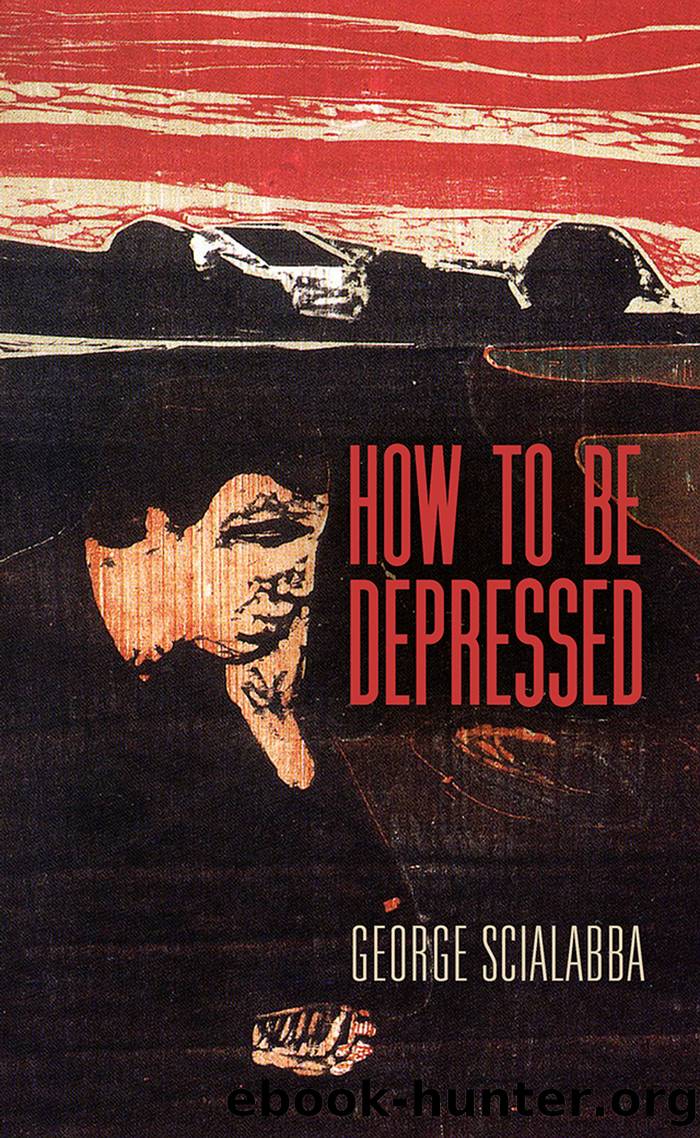How To Be Depressed by George Scialabba

Author:George Scialabba
Language: eng
Format: epub
Publisher: University of Pennsylvania Press
Published: 2020-06-14T16:00:00+00:00
* All proper names have been changed. For the sake of consistency and clarity, the formatting of certain elements has been standardized, such as dates and units of measurement. No substantive changes, however, have been made to the quoted material.
III. Conversation About Depression
CHRISTOPHER LYDON (CL): George, Iâm one of those friends of yours who is fascinated by and also grateful for your disclosure of your own clinical notes, the doctorsâ and professionalsâ notes on your state of mind, depressed mostly, over the last 30â40 years, mainly because we all live in the neighborhood of depression, our own or somebody elseâs. And talking about it does seem a constructive step. But I also wonder why you wanted to put these notes on the record, and how you read them, how you would read them as a kind of work of literature.
GEORGE SCIALABBA (GS): Theyâre very far from literature. And theyâre hardly written or composed at all. Theyâre a very distinct form of writing. Theyâre almost a form of anti-writing. It so happens that my current therapist teaches a course in how to write treatment notes. As we talked about this project of mine, she mentioned that, over the course of her career, 30 or 40 years, the note-writing process has changed drastically. It used to be a freer form, more candid and unhitched, uninhibited. Over time, as medical liability has become more of a concern and as the whole society has become more litigious, doctors have become self-protective, understandably, in a way. Theyâve shifted and limited the focus, not to express what may have struck them or puzzled them, not to set down something in their individual voice, just because thatâs an aspect of being human and being in contact with humans, but rather simply to give future clinicians, and in particular, emergency-room clinicians, something to work with if a crisis happens. The notes have become much more narrowly defined in their purpose and more guarded.
CL: Thereâs too much diagnostic lingo-bingo. I mean âsevere endogenous depression, super-imposed on a schizoid personality.â What did the man say? How did he look? What human connection was made? Not to mention, all this incredible list of pills youâve taken over the years, yet nobody at the core of this record seems to know whatâs working, if anythingâs working. Is anything better than a placebo? Itâs all a kind of fantasy. This is a story without a plot, without characters, without hope, in a way.
GS: One of the things I have learned in recent years is that the definition of everything, including success in treatment, has been conditioned by the requirements of insurance companies and hospital administratorsâthe business side of the profession. In order to get paid for service, you need to be able to show the people who are shelling out that it works. And they demand quantitative measures, the equivalent of the corporationâs quarterly report. How do you quantify a long conversation in which a patient gradually sees the outlines of his or
Download
This site does not store any files on its server. We only index and link to content provided by other sites. Please contact the content providers to delete copyright contents if any and email us, we'll remove relevant links or contents immediately.
The Light of Days by Judy Batalion(827)
The Crime Book by DK(703)
Chasing the Thrill by Daniel Barbarisi(653)
1312, Among the Ultras by James Montague(585)
The Doctor Who Fooled the World by Brian Deer(564)
Till Murder Do Us Part by James Patterson(557)
E.R. Nurses by James Patterson(557)
Invention by James Dyson(556)
The Complete Correspondence 1928-1940 by Theodor W. Adorno & Walter Benjamin(502)
Climb by Susan Spann(487)
Mind Games by Neville Southall(478)
Space 2069 by David Whitehouse(473)
The Dream Architects by David Polfeldt(473)
The Reporter by Mark Paul Smith(472)
Surely you Ìre joking, Mr Feynman by Richard Feynman(457)
If You Should Fail by Joe Moran(441)
Masterful Marks: Cartoonists Who Changed the World by Monte Beauchamp(429)
The 'Wolfman' by Sigmund Freud & Sigmund Freud(427)
Banking and Beyond by Unknown(420)
